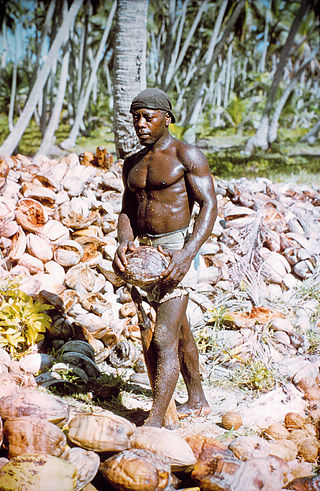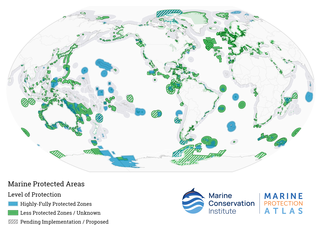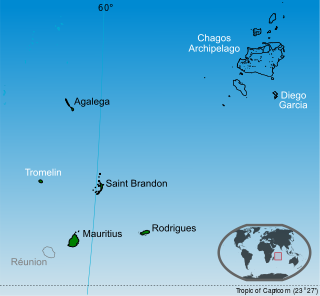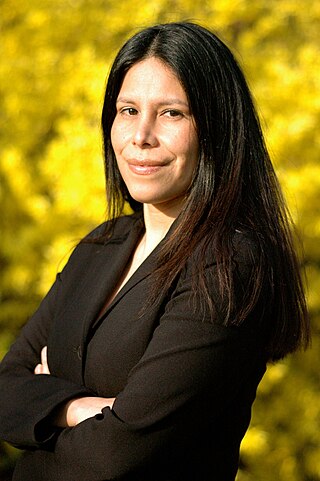Related Research Articles

Diego Garcia is an island of the British Indian Ocean Territory, an overseas territory of the United Kingdom. It is a militarised atoll just south of the equator in the central Indian Ocean, and the largest of the 60 small islands of the Chagos Archipelago. The Portuguese were the first Europeans to find it and it was then settled by the French in the 1790s and transferred to British rule after the Napoleonic Wars. It was one of the "Dependencies" of the British Colony of Mauritius until the Chagos Islands were detached for inclusion in the newly created British Indian Ocean Territory (BIOT) in 1965.

Mauritius, officially the Republic of Mauritius, is an island nation in the Indian Ocean about 2,000 kilometres off the southeast coast of the African continent, east of Madagascar. It includes the main island, as well as Rodrigues, Agaléga and St. Brandon. The islands of Mauritius and Rodrigues, along with nearby Réunion, are part of the Mascarene Islands. The main island of Mauritius, where most of the population is concentrated, hosts the capital and largest city, Port Louis. The country spans 2,040 square kilometres (790 sq mi) and has an exclusive economic zone covering 2,300,000 square kilometres.

The Permanent Court of Arbitration (PCA) is a non-UN intergovernmental organization located in The Hague, Netherlands. Unlike a judicial court in the traditional sense, the PCA provides services of arbitral tribunal to resolve disputes that arise out of international agreements between member states, international organizations or private parties. The cases span a range of legal issues involving territorial and maritime boundaries, sovereignty, human rights, international investment, and international and regional trade. The PCA is constituted through two separate multilateral conventions with a combined membership of 122 states. It is not a United Nations agency, but a United Nations observer.

The Lesser Antilles are a group of islands in the Caribbean Sea. Most of them are part of a long, partially volcanic island arc between the Greater Antilles to the north-west and the continent of South America. The islands of the Lesser Antilles form the eastern boundary of the Caribbean Sea where it meets the Atlantic Ocean. Together, the Lesser Antilles and the Greater Antilles make up the Antilles. The Lesser and Greater Antilles, together with the Lucayan Archipelago, are collectively known as the West Indies.

The terms international waters or transboundary waters apply where any of the following types of bodies of water transcend international boundaries: oceans, large marine ecosystems, enclosed or semi-enclosed regional seas and estuaries, rivers, lakes, groundwater systems (aquifers), and wetlands.

The Chagos Archipelago or Chagos Islands is a group of seven atolls comprising more than 60 islands in the Indian Ocean about 500 kilometres (310 mi) south of the Maldives archipelago. This chain of islands is the southernmost archipelago of the Chagos–Laccadive Ridge, a long submarine mountain range in the Indian Ocean. In its north are the Salomon Islands, Nelson's Island and Peros Banhos; towards its south-west are the Three Brothers, Eagle, Egmont and Danger Island(s); southeast of these is Diego Garcia, by far the largest island. All are low-lying atolls, save for a few extremely small instances, set around lagoons.

The Chagossians are an African ethnic group originating from French slaves brought to the Chagos Islands, specifically Diego Garcia, Peros Banhos, and the Salomon island chain, in the late 18th century. Most Chagossians now live in Mauritius and the United Kingdom after being forcibly removed by the British government in the late 1960s and early 1970s so that Diego Garcia, the island where most Chagossians lived, could serve as the location for a United States military base. Today, no Chagossians are allowed to live on the island of Diego Garcia, as it is now the site of the military base dubbed Camp Thunder Cove.

An exclusive economic zone (EEZ), as prescribed by the 1982 United Nations Convention on the Law of the Sea, is an area of the sea in which a sovereign state has special rights regarding the exploration and use of marine resources, including energy production from water and wind. It stretches from the outer limit of the territorial sea out to 200 nautical miles (nmi) from the coast of the state in question. It is also referred to as a maritime continental margin and, in colloquial usage, may include the continental shelf. The term does not include either the territorial sea or the continental shelf beyond the 200 nautical mile limit. The difference between the territorial sea and the exclusive economic zone is that the first confers full sovereignty over the waters, whereas the second is merely a "sovereign right" which refers to the coastal state's rights below the surface of the sea. The surface waters are international waters.

The United Nations Commission on International Trade Law (UNCITRAL) is a subsidiary body of the U.N. General Assembly (UNGA) responsible for helping to facilitate international trade and investment.

Marine protected areas (MPA) are protected areas of seas, oceans, estuaries or in the US, the Great Lakes. These marine areas can come in many forms ranging from wildlife refuges to research facilities. MPAs restrict human activity for a conservation purpose, typically to protect natural or cultural resources. Such marine resources are protected by local, state, territorial, native, regional, national, or international authorities and differ substantially among and between nations. This variation includes different limitations on development, fishing practices, fishing seasons and catch limits, moorings and bans on removing or disrupting marine life. In some situations, MPAs also provide revenue for countries, potentially equal to the income that they would have if they were to grant companies permissions to fish. The value of MPA to mobile species is unknown.
The United Kingdom, at the request of the United States, began expelling the native inhabitants of the Chagos Archipelago in 1968, concluding its forced deportations on 27 April 1973 with the evacuation of Peros Banhos atoll. The inhabitants, known at the time as the Ilois, are today known as Chagos Islanders or Chagossians.
An arbitration award is a determination on the merits by an arbitration tribunal in an arbitration, and is analogous to a judgment in a court of law. It is referred to as an 'award' even where all of the claimant's claims fail, or the award is of a non-monetary nature.

Arbitration is a form of alternative dispute resolution (ADR) that resolves disputes outside the judiciary courts. The dispute will be decided by one or more persons, which renders the 'arbitration award'. An arbitration decision or award is legally binding on both sides and enforceable in the courts, unless all parties stipulate that the arbitration process and decision are non-binding.

An arbitral tribunal or arbitration tribunal, also arbitration commission, arbitration committee or arbitration council is a panel of unbiased adjudicators which is convened and sits to resolve a dispute by way of arbitration. The tribunal may consist of a sole arbitrator, or there may be two or more arbitrators, which might include a chairperson or an umpire. Members selected to serve on an arbitration panel are typically professionals with expertise in both law and in friendly dispute resolution (mediation). Some scholars have suggested that the ideal composition of an arbitration commission should include at least also one professional in the field of the disputed situation, in cases that involve questions of asset or damages valuation for instance an economist.

The British Indian Ocean Territory (BIOT) is an Overseas Territory of the United Kingdom situated in the Indian Ocean, halfway between Tanzania and Indonesia. The territory comprises the seven atolls of the Chagos Archipelago with over 1,000 individual islands – many very small – amounting to a total land area of 60 square kilometres. The largest and most southerly island is Diego Garcia, 27 square kilometres, the site of a Joint Military Facility of the United Kingdom and the United States.

Barbados v. Trinidad and Tobago was a 2006 arbitral case between Barbados and Trinidad and Tobago in which the tribunal resolved the maritime border dispute between the two countries. The dispute was arbitrated before an arbitral tribunal constituted under Annex VII of the United Nations Convention on the Law of the Sea, in which the Permanent Court of Arbitration served as registry.

Sovereignty over the Chagos Archipelago is disputed between Mauritius and the United Kingdom. Mauritius has repeatedly stated that the Chagos Archipelago is part of its territory and that the United Kingdom claim is a violation of United Nations resolutions banning the dismemberment of colonial territories before independence. The UK government has stated that it has "no doubt" about its sovereignty over the Chagos, yet has also said that the Chagos will be returned to Mauritius once the islands are no longer required for military purposes. Given the absence of any meaningful progress with the UK, Mauritius took up the matter at various legal and political forums. The African Union and the Non-Aligned Movement have expressed unanimous support for Mauritius.
The Chagos Marine Protected Area, located in the central Indian Ocean in the British Indian Ocean Territory of the United Kingdom, is one of the world's largest marine protected areas, and one of the largest protected areas of any type on Earth. It was established by the British government on 1 April 2010 as a massive, contiguous, no-take marine reserve, it encompasses 640,000 square kilometres (250,000 sq mi) of ocean waters, including roughly 70 small islands and seven atolls of the Chagos Archipelago.

Philippines v. China, also known as the South China Sea Arbitration, was an arbitration case brought by the Republic of the Philippines against the People's Republic of China (PRC) under Annex VII of the United Nations Convention on the Law of the Sea concerning certain issues in the South China Sea, including the nine-dash line introduced by the Republic of China (Taiwan) since as early as 1947. A tribunal of arbitrators appointed the Permanent Court of Arbitration (PCA) as the registry for the proceedings.

Monica Feria Tinta is a British-Peruvian barrister, a specialist in public international law, at the Bar of England & Wales. She practises from Twenty Essex, London. "The Lawyer" magazine featured her in its "Hot 100" 2020 list, as amongst "the most daring, innovative and creative lawyers" in the United Kingdom. She has also been shortlisted as "Barrister of the Year" by the Lawyer's Awards 2020, alongside Lord Pannick QC, one of the UK's highly regarded advocates.
References
- 1 2 3 4 5 6 "The Republic of Mauritius v. The United Kingdom of Great Britain and Northern Ireland". Archived from the original on 2012-07-29. Retrieved 2012-06-10.
- ↑ Arbitrators Appointed in the Mauritius v UK Case concerning the Chagos Islands « EJIL: Talk!
- ↑ "In the Matter of the Chagos Marine Protected Area Arbitration - before - an Arbitral Tribunal constituted under Annex VII of the United Nations Convention of the Law of the Sea- between - the Republic of Mauritius - and - the United Kingdom of Great Britain and Northern Ireland" (PDF). Permanent Court of Arbitration. 18 March 2015.
- ↑ The American Society of International Law (Archived)
- ↑ Bowcott, Owen; Vidal, John (January 28, 2013). "Britain faces UN tribunal over Chagos Islands marine reserve". The Guardian. Retrieved May 17, 2013.
- ↑ "PCA Press Release, The Republic of Mauritius v. The United Kingdom of Great Britain and Northern Ireland". Permanent Court of Arbitration. January 22, 2013. Retrieved July 25, 2016.
- ↑ In the Matter of the Chagos Marine Protected Area Arbitration - before - an Arbitral Tribunal constituted under Annex VII of the United Nations Convention of the Law of the Sea- between - the Republic of Mauritius - and - the United Kingdom of Great Britain and Northern Ireland, award of the arbitral tribunal dated 18 March 2015, accessed July 25, 2016, paragraphs 544-547: "In concluding that the declaration of the MPA was not in accordance with the provisions of the Convention, the Tribunal has taken no view on the substantive quality or nature of the MPA or on the importance of environmental protection. The Tribunal’s concern has been with the manner in which the MPA was established, rather than its substance. It is now open to the Parties to enter into the negotiations that the Tribunal would have expected prior to the proclamation of the MPA, with a view to achieving a mutually satisfactory arrangement for protecting the marine environment, to the extent necessary under a “sovereignty umbrella”... DECLARES, unanimously, that in establishing the MPA surrounding the Chagos Archipelago the United Kingdom breached its obligations under Articles 2(3), 56(2), and 194(4) of the Convention.
